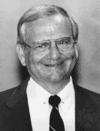- Iacocca, Lee
-
born Oct. 15, 1924, Allentown, Pa., U.S.U.S. automobile executive.He was hired as an engineer by Ford Motor Co. but soon moved to its sales department and was noted for his successful promotion of the sporty yet inexpensive Mustang. He rose rapidly, becoming president of Ford in 1970. His brash manner led to his dismissal by Henry Ford II in 1978. A year later he was hired by the nearly bankrupt Chrysler Corp. He persuaded Congress to lend Chrysler $1.5 billion in 1980 and carried out layoffs, wage cuts, and plant closings to make the company more efficient. He also shifted the company's emphasis to more fuel-efficient cars and embarked on an aggressive advertising campaign. Within a few years Chrysler was showing record profits, and Iacocca was a national celebrity with a best-selling autobiography, Iacocca (1984). He retired in 1992.
 Iacocca, 1983UPI/Bettmann
Iacocca, 1983UPI/Bettmann* * *
▪ American businessmanbyname of Lido Anthony Iacoccaborn Oct. 15, 1924, Allentown, Pa., U.S.American automobile executive who, as president and chairman of the board of the foundering Chrysler Corporation (Chrysler LLC), secured the largest amount of federal financial assistance ever given to a private corporation at that time.The son of an Italian immigrant, Iacocca graduated from Lehigh University, Bethlehem, Pa., in 1945 and received a master's degree in engineering from Princeton University in 1946. Hired as an engineer by the Ford Motor Company, he quickly proved that he was better suited for sales. By 1960 he had become general manager of the Ford division and a vice-president of the company. Iacocca's increasing influence at Ford was hastened by his successful promotion of the sporty yet inexpensive Mustang. He was named president of Ford in 1970, but his brash, unorthodox manner led to his dismissal in 1978.The following year Iacocca was hired by the Chrysler Corporation, which, having accumulated a huge inventory of low-mileage cars at a time of rising fuel prices, faced bankruptcy. Iacocca appealed to the federal government for aid, gambling that it would not allow Chrysler to fail when the national economy was already depressed. Although his request sparked intense debate over the role of government in a market economy, Congress in 1980 agreed to guarantee $1,500,000,000 in loans if the company could raise another $2,000,000,000 on its own. Iacocca responded by finding new sources of credit and by trimming operations, closing plants, and persuading labour unions to accept layoffs and wage cuts. He then shifted the company's emphasis to fuel-efficient models and undertook an aggressive advertising campaign that included personal appearances on television commercials. By 1981 Chrysler showed a small profit, and three years later it announced record profits of more than $2,400,000,000. Iacocca became a national celebrity. His autobiography, Iacocca (1984), and a second book, Talking Straight (1988), were best-sellers. Iacocca retired as Chrysler's chief executive in 1992.* * *
Universalium. 2010.
